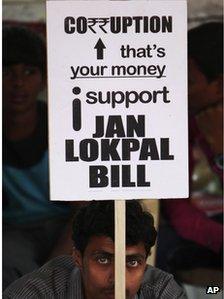India anti-corruption bill 'mixed success', say media
- Published

A string of major corruption scandals has hit the government's reputation
India's media say the passing of an anti-corruption bill in the lower house of parliament is a mixed success for the Congress-led government.
The Lokpal bill sets up an independent ombudsman with the power to prosecute politicians and civil servants.
Though the MPs passed the bill, they defeated a separate bill giving constitutional status to the ombudsman, a key demand of the Congress party.
Campaigner Anna Hazare has called the bill "useless" but has ended his fast.
He has threatened instead to launch a campaign of civil disobedience that would fill the country's jails.
Medics say that the 74-year-old has a fever and high blood pressure which would have got worse if he had continued his fast in Mumbai (Bombay). He had refused to eat since Tuesday.
He and his supporters say that tougher measures are required in the bill if it is to prove effective at reducing the level of corruption in India.
The BBC's Soutik Biswas in Delhi says that Mr Hazare's crusade is now well on the way to becoming a full-blown, openly political campaign against the Congress party.
The Lokpal bill was passed by the lower house of parliament after a debate of nearly 10 hours involving speeches by about 40 MPs late on Tuesday.
It is likely to be put to vote in the upper house on Thursday, where it needs to be passed in order to become law.
'Sad day for democracy'
Prime Minister Manmohan Singh said the passage of the bill was a "special moment" in the life of the nation.
But the Finance Minister Pranab Mukherjee said it was a "sad day for democracy" because the government could not secure the passage of a bill that would have given constitutional status to the ombudsman.
The government failed to get the two-thirds majority it needed to make the bill a constitutional amendment.
Reports say that a number of MPs from Congress and its allies were not present in the lower house during the voting, leading to speculation that the former may seek an explanation from the missing MPs.
"Lokpal: UPA [United Progressive Front or the Congress-led ruling coalition] wins one, loses one", said the Indian Express newspaper in its headline.
"If this was history in the making, it was messy and half-baked... Sloppy floor management coupled with a lame attempt by the Congress to turn the tables on the [main opposition party] BJP - for not falling in line" ensured that the bill to give constitutional status to the Lokpal fell through, it said.
"Huge Slap On Government's face", The Pioneer said in its headline.
The newspaper said the opposition had the "last laugh" by rejecting constitutional status.
The Economic Times said the Lokpal bill was passed in the lower house "after many failures".
The newspaper said the government "may find it difficult" to get the bill passed in the upper house as it was "short of numbers".
Opposition parties, including the BJP, have also the Lokpal bill, despite the government agreeing to several changes.
Mr Mukherjee, however, said: "We have waited for 40 years and cannot wait any longer. The pursuit of the best [law] cannot be an excuse for delaying a good one."
During the debate on Tuesday, Mr Singh said it was the duty of parliament to determine the passage of the law, in an apparent reference to Mr Hazare, whose 12-day anti-corruption fast in August became the focus of a national campaign and put pressure on the government to act on the issue.
Mr Hazare's main complaint is that the bill proposes keeping India's top investigation agency, CBI, out of the purview of the ombudsman.
In other words, the nine-member Lokpal committee - which will include the ombudsman - will not have its own investigative agency, a major demand of anti-corruption activists like Mr Hazare and many opposition parties.
A recent survey said corruption in India had cost billions of dollars and threatened to derail growth.
- Published28 December 2011
- Published3 December 2011
- Published4 November 2011
- Published18 April 2012
- Published7 June 2011
- Published1 December 2011